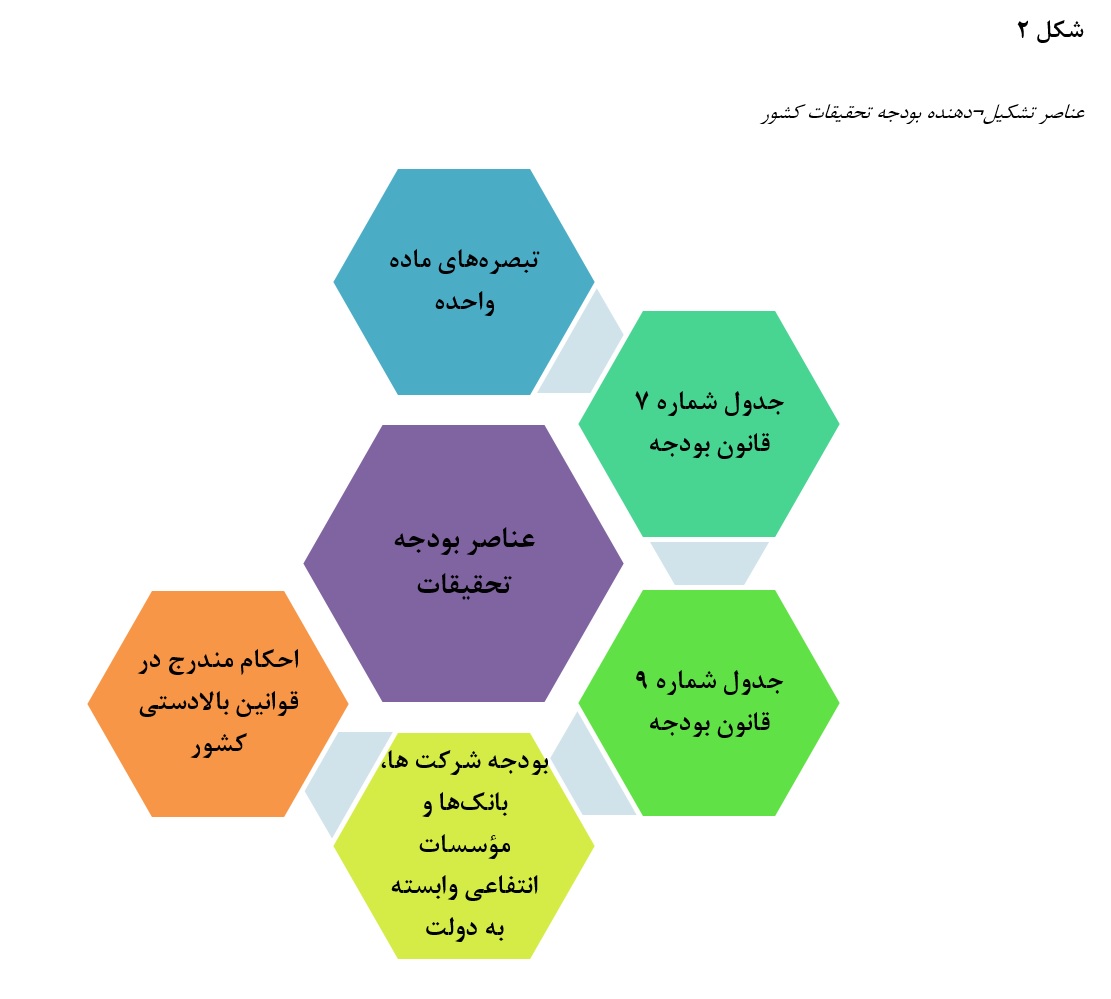Preparing an Optimal Organizational Structure for the Establishment of the Supreme Council of Science, Research, and Technology Fund
Keywords:
Organizational Structure, Supreme Council of Science, Research, and Technology Fund, Research and Development , Financial Resource Allocation, Innovation Management, Science and Technology Policies, Centralized Research FundingAbstract
This study aims to design an optimal organizational structure for the establishment of the Supreme Council of Science, Research, and Technology Fund in Iran. Research and development (R&D) are pivotal in advancing national capacities and fostering economic resilience. In Iran, despite various financial resources, the fragmented funding allocation to research has been a significant challenge. Establishing a specialized fund aims to centralize financial support for research and innovation, aligning with national science and technology policies. The Supreme Council of Science, Research, and Technology Fund was proposed to address inefficiencies in Iran's decentralized research funding system. The fund's primary goal is to pool scattered resources across various governmental bodies and direct them toward national priorities in science and technology. To ensure the success of this fund, a comprehensive organizational structure is essential. This study reviews the legal frameworks, budgetary structures, and existing research funds to propose a model that optimizes resource allocation and management. Through detailed analysis, this paper proposes a new organizational chart, governance policies, and administrative guidelines for the fund. The goal is to establish a fund that operates efficiently, remains adaptable to evolving national needs, and encourages collaboration between academic institutions, industries, and government sectors. This study offers a blueprint for the strategic implementation of this fund, emphasizing transparency, accountability, and alignment with Iran’s long-term scientific and technological development goals.
Downloads
References
Abbasi, H., & Fattahian, N. (2018). The Impact of Strategic Learning on Organizational Performance with the Mediating
Role of Strategic Agility (Case Study: Sports and Youth Departments of Hamadan and Kermanshah Provinces).
Contemporary Research Journal in Sports Management(15), 29-43. https://smms.basu.ac.ir/article_2442.html
Abrokwah-Larbi, K. (2024). Transforming Metaverse Marketing Into Strategic Agility in SMEs Through Mediating
Roles of IMT and CI: Theoretical Framework and Research Propositions. Journal of Contemporary Marketing
Science, 7(1), 56-83. https://doi.org/10.1108/jcmars-08-2023-0034
Arsawan, I. W. E., Hariyanti, N. K. D., Atmaja, I. M. A. D. S., Suhartanto, D., & Koval, V. (2022). Developing
Organizational Agility in SMEs: An Investigation of Innovation’s Roles and Strategic Flexibility. Journal of Open
Innovation Technology Market and Complexity, 8(3), 149. https://doi.org/10.3390/joitmc8030149
Aswan, A. (2023). Moderation Role of Strategic Agility in the Relationship Between Entrepreneurial Orientation and
Competitive Advantage in SMEs. Jurnal Manajemen Bisnis, 14(1), 125-142.
https://doi.org/10.18196/mb.v14i1.16242
Chaney, D., Carrillat, F. A., & Zouari, A. (2019). Uncovering institutional orientation as a new strategic orientation in
industrial marketing. Industrial Marketing Management, 1-9. https://doi.org/10.1016/j.indmarman.2018.07.011
Gielnik, M., Uy, A. M., Funken, R., & Bischoff, K. M. (2017). Boosting and sustaining passion: A long-term perspective
on the effects of entrepreneurship training. Journal of Business Venturing, 1-20.
https://doi.org/10.1016/j.jbusvent.2017.02.003
Gilan Chamber of Commerce Website. (2018). https://iccimguil.ir/
Golmohammadi, E., Mohammadi, E., Tolabi, Z., & Khalil Nezhad, S. (2021). Designing a Strategic Agility Model with
the Dynamic Capabilities Approach in the Banking Industry (Case Study: Active Banks in Ilam Province).
Commercial Strategies, 18(17), 121-146. https://doi.org/10.22070/cs.2022.15485.1189
Khan, S. H., Majid, A., & Yasir, M. (2021). Strategic renewal of SMEs: the impact of social capital, strategic agility and
absorptive capacity. Management Decision, 59(8), 1877-1894. https://doi.org/10.1108/MD-12-2019-1722
Kohtamaki, M., Parida, V., Patel, P. C., & Gebauer, H. (2020). The role of servitization in capturing the financial potential
of digitalization. Technological and Social Change, 151. https://doi.org/10.1016/j.techfore.2019.119804
Miri Rami, S. F., Delgoshaei, Y., & Mahmoudi, A. H. (2022). Identification and Analysis of Effective Factors on the
Strategic Intelligence of Education Districts Managers of Tehran City and Provide an Appropriate Model [Research
Article]. Iranian Journal of Educational Sociology, 5(1), 113-125. https://doi.org/10.61186/ijes.5.1.113
Ozarallı, N. (2015). Linking empowering leader to creativity: the moderating role of psychological (felt) empowerment.
Procedia - Social and Behavioral Sciences, 181, 366-376. https://doi.org/10.1016/j.sbspro.2015.04.899
Papla, R., Yeltayeva, D., & Pak, D. (2022). Strategic Agility in the Context of Smes. Interconf(19(99)), 102-109.
https://doi.org/10.51582/interconf.19-20.02.2022.012
Pilpa, H., & Farokhian, S. (2020). The Impact of Strategic Human Resource Management on Organizational Performance
with the Mediating Role of Entrepreneurial Orientation. Applied Research in Management and Accounting(17), 96-
https://www.sid.ir/paper/398914/fa
Posch, A., & Garaus, C. (2019). Boon or Curse? A Contingent View on the Relationship between Strategic Planning and
Organizational Ambidexterity. Long Range Planning, 1-56.
ca_en_microempresas_emprendedoras
Rezazadeh, M. (2016). Analysis of the Impact of Brand Equity on the Growth of Small and Medium Enterprises
Considering the Mediating Role of Brand Trust (Case Study: Small and Medium Enterprises in Rasht) [Master's
Thesis, Zanjan University of Azad. https://civilica.com/doc/396666/
Ribeiro, V. (2024). Procurement Outsourcing Strategies and Organizational Agility: A Comparative Analysis of
Pharmaceutical Companies in Brazil. Global Journal of Purchasing and Procurement Management, 3(1), 28-41.
https://doi.org/10.47604/gjppm.2468
Rožman, M., Tominc, P., & Štrukelj, T. (2023). Competitiveness Through Development of Strategic Talent Management
and Agile Management Ecosystems. Global Journal of Flexible Systems Management, 24(3), 373-393.
https://doi.org/10.1007/s40171-023-00344-1
Shams, R., Vrontisb, D., Belyaevac, Z., Ferrarisc, A., & Czinkotae, M. R. (2020). Strategic agility in international
business: A conceptual framework for "agile" multinationals. 1-10. https://doi.org/10.1016/j.intman.2020.100737
Yang, Y., Lee, P., & Cheng, T. (2015). Continuous improvement competence, employee creativity, and new service
development performance: A frontline employee perspective. International Journal of Production Economics, 1-14.
https://journals.sagepub.com/doi/10.1177/15344843211024028
Zaki Poor, M., Rostami, M., & Saei Nia, H. (2016). Enhancing Organizational Agility Through Human Resource
Management Functions (Case Study: Rail Industry Development Company). Quarterly Journal of Human Resource
Studies, 6(19), 27-45. https://www.jhrs.ir/article_65344.html

Downloads
Published
Submitted
Revised
Accepted
Issue
Section
License
Copyright (c) 2024 Journal of Technology in Entrepreneurship and Strategic Management (JTESM)

This work is licensed under a Creative Commons Attribution-NonCommercial 4.0 International License.










